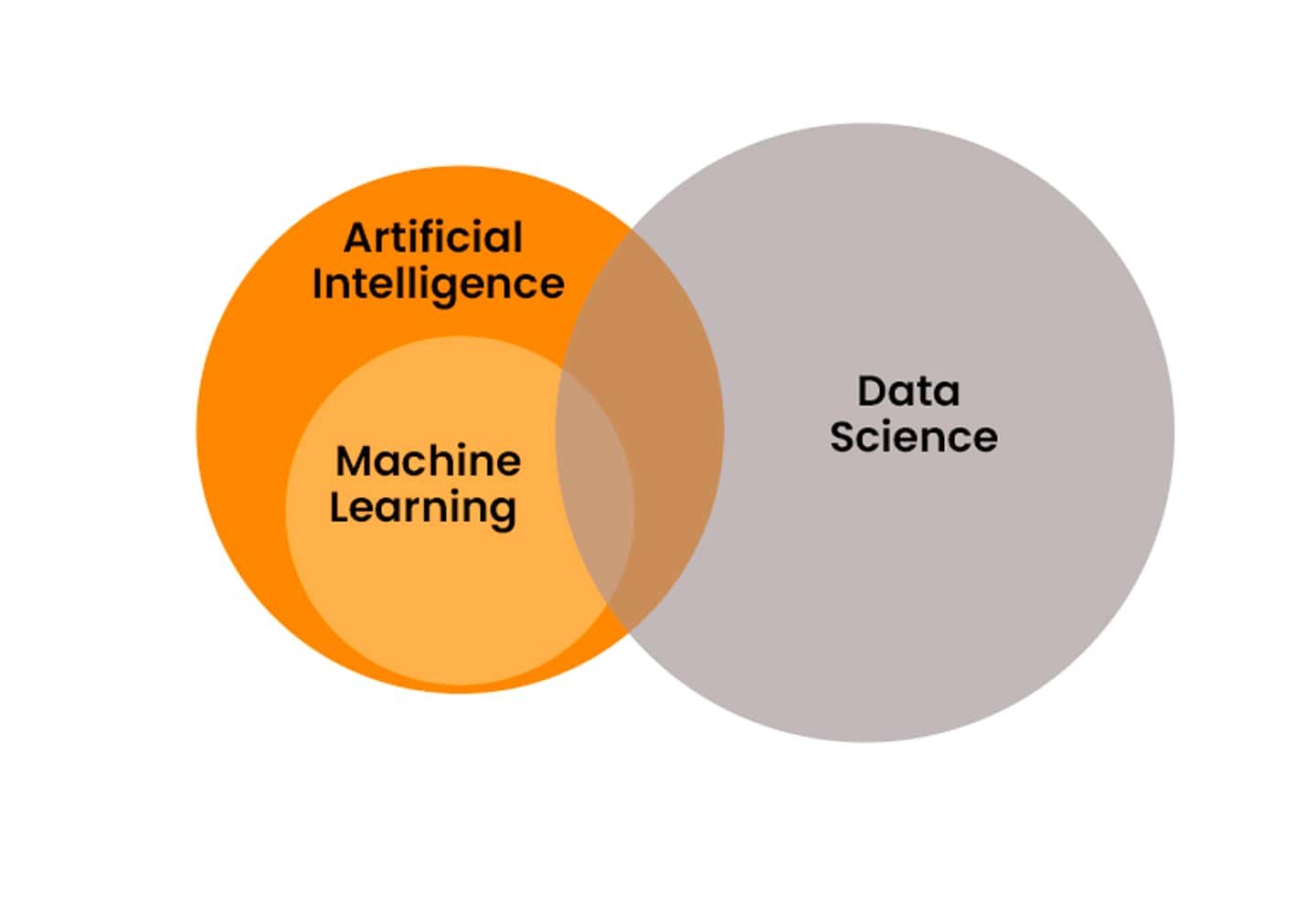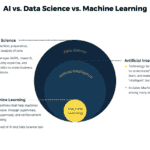Summary: In the tech landscape of 2024, the distinctions between Data Science and Machine Learning are pivotal. Data Science extracts insights, while Machine Learning focuses on self-learning algorithms. The collective strength of both forms the groundwork for AI and Data Science, propelling innovation. Markets for each field are booming, offering diverse job roles, especially in Machine Learning for Data Analytics. Opportunities abound in sectors like healthcare, finance, and automation. As we navigate this landscape, the interconnected world of Data Science, Machine Learning, and AI defines the era of 2024, emphasising the importance of these fields in shaping the future.
2024 Tech breakdown: Understanding Data Science vs ML vs AI
Quoting Eric Schmidt, the former CEO of Google, ‘There were 5 exabytes of information created between the dawn of civilisation through 2003, but that much information is now created every two days.’
As we navigate the expansive tech landscape of 2024, understanding the nuances between Data Science vs Machine Learning vs ai.
In this era of data deluge, mastering these distinctions becomes more than a choice; it’s a necessity. Join me on this journey as we unravel the intricacies of 2024’s tech revolution, exploring the realms of data, intelligence, and the opportunity for growth, including a special mention of a free Machine Learning course.
Key takeaways
- Data Science lays the groundwork for Machine Learning, providing curated datasets for ML algorithms to learn and make predictions.
- Artificial Intelligence incorporates Data Science and Machine Learning, leveraging structured datasets and learning capabilities for human-like decision-making.
- Data Science enhances ML accuracy through preprocessing and feature engineering expertise.
- ML catalyses AI advancements, enabling systems to evolve and improve decision-making.
- AI automates and optimises Data Science workflows, expediting analysis for strategic decision-making.
Data Science Vs Machine Learning Vs AI
| Aspect | Data Science | Artificial Intelligence | Machine Learning |
| Definition | Data Science is the field that deals with the extraction of knowledge and insights from data through various processes. | AI refers to developing machines capable of performing tasks that require human intelligence. | ML is a subset of AI, focusing on developing algorithms that enable computers to learn patterns from data. |
| Scope | Data Science involves extracting insights from structured and unstructured data, often utilising statistical techniques. | AI encompasses the broader concept of machines simulating human intelligence across various tasks. | ML focuses on enabling computers to learn from data and improve performance over time without explicit programming. |
| Key Components | In Data Science, key components include data cleaning, Exploratory Data Analysis, and model building using statistical techniques. | AI comprises Natural Language Processing, computer vision, and robotics. | ML focuses on algorithms like decision trees, neural networks, and support vector machines for pattern recognition. |
| Skills | Proficiency in programming languages (Python, R), statistical analysis, and domain expertise are crucial. | Requires a blend of computer science, mathematics, and domain-specific knowledge, often involving complex algorithms. | Emphasises programming skills, understanding of algorithms, and expertise in Data Analysis. |
| Market Value and Growth | In 2021, the market size of Global Data Science platforms reached USD 64.14 billion. Anticipated growth is significant, with projections indicating an increase from USD 81.47 billion in 2022 to a remarkable USD 484.17 billion by 2029. This trajectory reflects a notable Compound Annual Growth Rate (CAGR) of 29.0% throughout the forecast period. | In 2022, the worldwide market size for Artificial Intelligence (AI) reached USD 454.12 billion. Anticipated growth is substantial, with projections indicating an increase of approximately USD 2,575.16 billion by 2032. This expansion is set to occur at a noteworthy CAGR of 19% from 2023 to 2032. | In 2022, the worldwide market for Machine Learning (ML) reached a valuation of $19.20 billion. Anticipated growth is evident as it is projected to expand from $26.03 billion in 2023 to an impressive $225.91 billion by 2030. This forecast suggests a remarkable CAGR of 36.2% over the specified period. |
| Job Roles | Data Scientist, Data Analyst, and Business Analyst are typical roles in Data Science. | AI Engineer, Machine Learning Engineer, and Robotics Engineer are prominent roles in AI. | ML Engineer, Data Scientist, and Research Scientist are typical roles in Machine Learning. |
| Emerging Trends | Emerging trends in Data Science include integrating AI technologies and the rise of Explainable AI for transparent decision-making. | AI trends involve increased focus on ethical AI, AI-powered automation, and the development of more sophisticated Natural Language Processing. | ML trends include the rise of AutoML, reinforcement learning applications, and advancements in unsupervised learning techniques. |
| Opportunities | Opportunities in Data Science are vast, spanning industries like healthcare, finance, and e-commerce. | AI offers opportunities in automation, robotics, virtual assistants, and innovative solutions across sectors. | ML opportunities are evident in predictive analytics, recommendation systems, and autonomous systems development. |
Interconnection and complementation
In the dynamic realm of technology, Data Science, Machine Learning (ML), and Artificial Intelligence (AI) share intricate relationships, each influencing and complementing the other.
Data Science and Machine Learning synergy
Data Science forms the bedrock upon which Machine Learning stands. They harness their expertise to collect, clean, and interpret vast datasets. This curated data fuels Machine Learning algorithms, enabling them to learn and make predictions. The interplay between Data Science and ML is symbiotic – while Data Science provides the necessary groundwork, ML extracts meaningful insights and patterns.
Artificial Intelligence integration
Artificial Intelligence, in turn, embraces both Data Science and Machine Learning, weaving them into its fabric. AI algorithms rely on the structured datasets curated by Data Scientists and the learning capabilities of Machine Learning models. Through this collaboration, AI systems can emulate human-like decision-making processes, demonstrating the collective strength of the trio.
Complementary aspects: Instances where expertise enhances capabilities
- Data Science enhancing Machine Learning accuracy
The precision of Machine Learning models hinges on the quality of input data. Data Scientists with their expertise in data preprocessing and feature engineering, significantly enhance the accuracy and reliability of ML algorithms.
- Machine Learning advancing Artificial Intelligence capabilities
Machine Learning catalyses Artificial Intelligence advancements. The ability of ML models to learn and adapt empowers AI systems to evolve and improve their decision-making processes over time.
- AI optimising Data Science processes
Artificial Intelligence automates and optimises various aspects of Data Science workflows. AI-driven tools expedite Data Analysis, allowing Data Scientists to focus on strategic decision-making rather than routine tasks.
FAQs
What is the significance of Data Science in 2024’s tech landscape?
Data Science extracts insights from vast data, which is crucial for industries. In 2024, its market is booming, offering healthcare, finance, and e-commerce opportunities.
How does AI differ from Machine Learning?
AI develops machines with human-like intelligence, while Machine Learning, a subset, focuses on algorithms enabling computers to learn patterns from data.
Are programming skills necessary for a career in Machine Learning?
Yes, proficiency in programming, understanding algorithms, and Data Analysis expertise are essential for a career in Machine Learning.
Wrapping up
Individuals eyeing growth in Data Science need to understand the line of difference between Data Science vs Machine Learning vs ai.
Data Science and Machine Learning synergy is symbiotic, forming the groundwork for Artificial Intelligence. As we ride the wave of technology, exploring AI and Data Science collectively showcases their strength.
This not only defines the era of 2024 but also opens doors to many opportunities. Take advantage of the chance to delve into Machine Learning for Data Analytics with a special mention of a free course, shaping the future.
Elevate Your Skills with Pickl.AI‘s Machine Learning 101 – A Free Course for Beginners! Dive into 20 video lessons and four modules and explore ML fundamentals quickly. Get certified, learn anytime, and enjoy lifetime access. Unleash your potential – Enroll now for the best Data Science course online for beginners!









![Best Data Science Certification Courses in India [Updated]](https://www.pickl.ai/blog/wp-content/uploads/2022/07/blog-img16-150x150.jpg)

